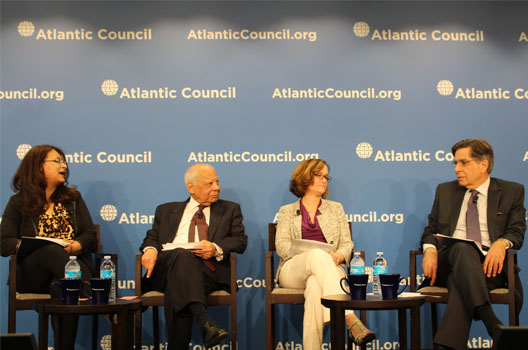 On June 15, 2016 the Atlantic Council’s Rafik Hariri Center for the Middle East launched a new issue brief, “The Economic Decline of Egypt after the 2011 Uprising,” coauthored by nonresident senior fellow Mohsin Khan and program assistant Elissa Miller. Hariri Center Deputy Director Mirette F. Mabrouk moderated a discussion between Khan, Dr. Hazem Beblawi, former prime minister of the Arab Republic of Egypt, and Caroline Freund, senior fellow at the Peterson Institute for International Economics. Hariri Center Director Ambassador Frederic C. Hof provided opening remarks.
On June 15, 2016 the Atlantic Council’s Rafik Hariri Center for the Middle East launched a new issue brief, “The Economic Decline of Egypt after the 2011 Uprising,” coauthored by nonresident senior fellow Mohsin Khan and program assistant Elissa Miller. Hariri Center Deputy Director Mirette F. Mabrouk moderated a discussion between Khan, Dr. Hazem Beblawi, former prime minister of the Arab Republic of Egypt, and Caroline Freund, senior fellow at the Peterson Institute for International Economics. Hariri Center Director Ambassador Frederic C. Hof provided opening remarks.
Hof opened the event by noting the challenges related to legitimacy that many governments in the Middle East and North Africa region are facing, and the role that economic development plays in legitimating governance. He emphasized the importance of governments creating economic opportunity in the region in order to achieve stabilizing legitimacy.
Mabrouk started the panel discussion by remarking on the economic difficulties that Egypt has faced since 2011, and the fact that current President Abdel Fattah al-Sisi came to power on a platform based on ensuring security and a stronger economy. Echoing the report, she explained that arresting the decline of Egypt’s economy needs to be the government’s priority.
Khan began his remarks by noting that while the period of 2005 to 2010 was the best of the past few decades for Egypt’s economy, the country’s macroeconomic picture from 2011 to 2015 worsened significantly in comparison. Sisi’s government has made some progress in cutting subsidies and pursuing external financing; however, the major fault lines present in the Egyptian economy during the 2005-2010 period–including high unemployment, a growing informal economy, rising income inequality, crony capitalism, and a bloated bureaucracy–have yet to be addressed. Khan predicted that Egypt’s economy will not improve markedly in the current year, but rather it will stay “in the doldrums”–neither sinking nor rising.
Beblawi began by outlining the constraints facing the Egyptian economy, namely rapid population growth, limited natural resources, a large and inefficient bureaucracy, and a high rate of consumption. He agreed with Khan that Egypt needs significant foreign investment, but disagreed that adjustments to the exchange rate would improve Egypt’s economic standing. Rather, he argued that Egypt suffers from a combination of heavy reliance on imports and low-quality exports that do not penetrate the international market. He then moved to discussing the economic costs of Egypt’s transition. Like Khan, he noted that noted that insecurity in Egypt during the transition period has had a negative effect on the country’s economy and growth. He concluded, however, on a positive note, emphasizing that Egypt’s local energy market—particularly the recent gas discover at the Zohr field—is a “bright spot” for the country’s economy.
Freund began by highlighting several of Egypt’s economic advantages, including Egypt’s well-placed global economic location between Asia, Europe, and sub-Saharan Africa and the country’s attraction as a tourist destination. She also argued that Egypt’s rapid population growth could be viewed as a positive element, due to the country’s large labor force and its ability to meet foreign firms’ demands for labor. Still, Freund noted that Egypt suffers from a low rate of female labor force participation in Egypt and emphasized the need to bring women into the workforce. She said a failure to do so would mark a tremendous wasted resource.
Ultimately, while all of the panelists outlined the major challenge facing economic growth and recovery in Egypt, they agreed that there were positive areas upon which Egypt could capitalize to promote economic development. However, as Freund suggested, President Sisi may have missed his immediate post-election window of opportunity in 2014 to enact major reforms, and implementing such reforms now, while necessary, will not be easy.
